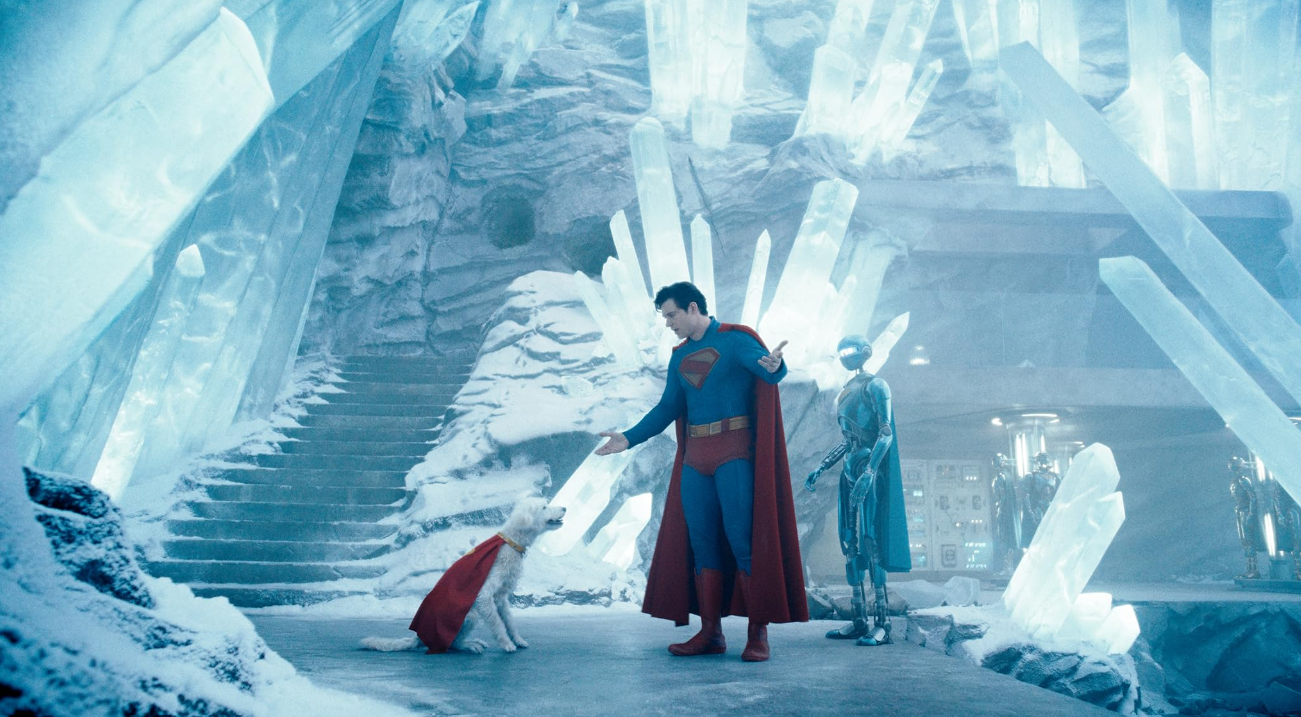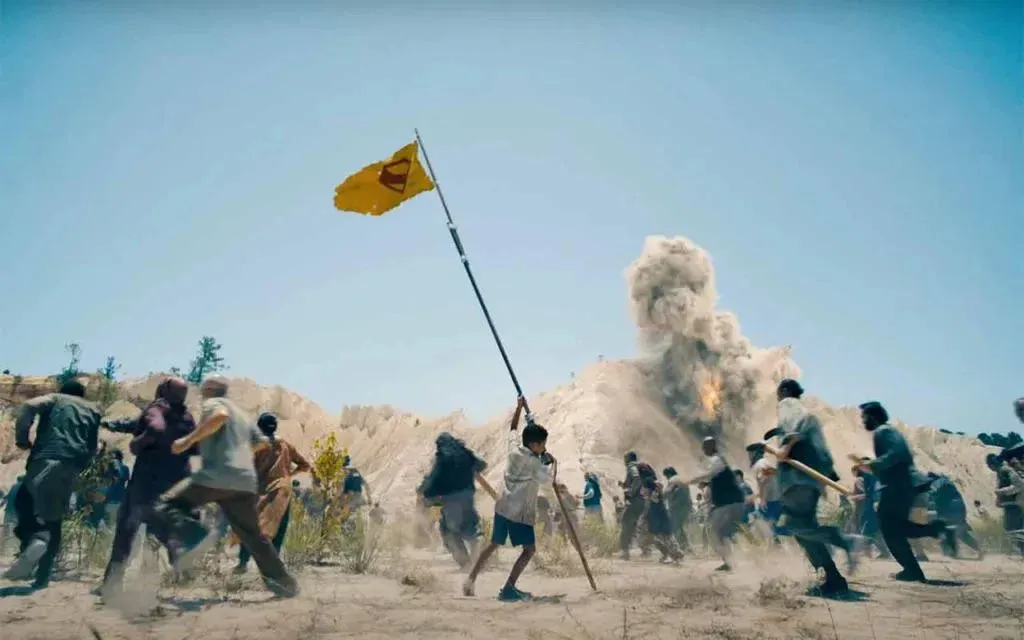Superman
[James Gunn is] the last director standing in the superhero factory with anything left in a vision of heroism to tap into.

Superhero movies no longer feel super because they’ve lost a vision for heroism. James Gunn, the director behind the Guardians of the Galaxy films and the new helmsman of the DC Universe, is the last director standing in the superhero factory with anything left in a vision of heroism to tap into. His first official film as the new co-CEO of DC Studios proves that these things still can be worthwhile. They just need a vision for the good like Superman.
Like most of Gunn’s other ventures in superherodom, he shows a negative interest in origin stories. Only Brightburn, ironically a horror adaptation of Superman’s origin, starts at the beginning. Departing from earlier versions, only one actor plays the character. There is no “Young Clark Kent” credited. Clark Kent (played by David Corenswet) is already past the honeymoon phase in his relationship with Lois Lane (Rachel Brosnahan), and he has already gotten himself in trouble with the American government before the film begins in earnest. He stopped the Slavically-coded Boravian invasion of the MENA stand-in Jarhanpur… do with the real-life political analogies what you will. (Add another entry to Hollywood’s Fakeistan phenomenon!) And the whole Visa-less border crossing and temporary detaining of a foreign head of state agitates the American government. Lex Luthor (Nicholas Hoult) conveniently stands in the waiting to leverage the moment to attack Superman’s reputation and profit from the war.
It’s a colorful film and that’s something Superman hasn’t been for a while. The red and blue of his outfit pop in a classically Americana way that the Henry Cavill character design never did. (Reminder: the two versions can both be good while being different.) It’s much closer to the Christopher Reeve version than to the Cavill-run, though Corenswet gets his ass kicked before we even meet him. He is more flawed, more human than the versions that come before him and that’s where the Average Joe appeal of Corenswet elevates the character.
The more successful and unimpeachable Gunn becomes as a filmmaker, the more his creative nepotism becomes a personal trademark. He is very loyal to his friends much like the teams he builds on screen. Within the first five minutes of screentime, we see his real-life dog Ozu as Krypto, Bradley Cooper (Rocket in the Guardians of the Galaxy films) as Jor-El, Michael Rooker (a trusted collaborator of Gunn’s since 2006’s Slither) as one of the AI Superman Robots and Pom Klementieff (Mantis in Guardians of the Galaxy Vol. 2) as another one. Henry Braham returns as cinematographer (Vol. 2 and Vol. 3, The Suicide Squad) and John Murphy (Vol. 3, The Holiday Special, The Suicide Squad) comes along to compose the score alongside David Fleming. Even long-time visual effects coordinator Stephane Ceretti made the jump from Marvel to DC to work alongside Gunn. Beyond the two leads, it’s not easy to find a person onscreen or behind it who has not worked with James Gunn before. It’s getting close to Gunnian cameo territory if it hasn’t crossed over yet.
Gunn and his collaborators are more competent than most at integrating action choreography with visual effects even if the portal and multiverse stuff is getting old. We have seen Gunn do most of this before, though. Mister Terrific (Edi Gathegi), a member of the Justice Gang and work acquaintance to Superman, is where the action gets the most déjà vu. His most important power is controlling flying super-tech spheres that shoot lasers and cause chaos. His big fight scene is shot almost identically to Yandu’s prison break in Guardians of the Galaxy Vol. 2 with a long shot of the controlled flying device (the red fin / T-Spheres) slaying countless enemies and frequently returning to the visual center of the controller (Yandu / Mr. Terrific). At least the flying looks a lot better than anything Gunn’s done before and potentially every other Superman flight for that matter. He feels as powerful as he is when he flies as when he fights.

The most rousing moment in the film isn’t a Superman fight but a call for help that he can’t match. Having already saved the people of Jarhanpur, a fictional Middle Eastern or North African developing nation not historically aligned with the United States from their Russian-coded and American allied neighborly oppressors, Superman watches the television as Boravia invades again and the Jarhanpurians mount a sticks and stone resistance and raise “S” flags to call the hero. Music swells and the shot perfectly vertically frames the triumphal spirit of the action à la Iwo Jima. (I do wonder how much stronger the scene would have been had he patriotically raised the Jarhanpur flag before their assembled militia, convicted of the ultimatum “give me freedom or give me death,” run to certain demise.) He has to stop some portal from ripping a hole in our reality or whatever to save all of Earth before he can specifically aid the people of Jarhanpur. A little boy stands before a technologically superior army and raises a homemade flag to call for help. It’s the strongest moment of heroism in the whole film and it’s anchored by a belief that asking for help is a strength and not a weakness.
One thing Gunn still remembers that nobody else making superhero films seems to is that the insignificant matter. This comes across in the details. To Gunn, it makes sense that Superman would save a family from a collapsing bridge in the same way that it makes sense he would save a squirrel from getting squished. The power gap between him and us is much larger than between us and rodents, so, of course, to be morally consistent, the squirrel needs saved too. That the public actually faces danger — and in the case of Malik Ali (Dinesh Thyagarajan), a Falafel shop owner who knows Superman, becomes a horrifying casualty in a torturous game of Russian roulette — is integral to the hero that is Clark Kent. The small guys matter to him. And that’s because these details matter to Gunn. That’s sort of the whole point at the center of traditional comic book filmmaking: that we, the insignificant little mammals that we are, are worth it.
A lot of the hubbub around the film comes from nonsensical malplayers who deny this. To them, some of us are more insignificant than others. Yes, Superman is political. The character always has been. “Truth, Justice, and the American Way” was the slogan that his comic book creators Jerry Siegel and Joe Shuster, two Jewish immigrants in Cleveland, Ohio, gave him. It’s not him that has changed; it’s us. When LexCorp uses real-time face-scanning technology to identify and later target, detain, and kill Malik — a brown man who sells Falafel for a living — it’s easy to make real-life parallels not because Gunn has politicized the DC hero for the first time or because Clark Kent has become a yellow dog Democrat but because our government is doing the same thing. It wouldn’t be political if it didn’t have something that looks so close to being a real-life analog. It is only possible to get angry about the depiction of endless bodies from foreign political prisoners to an alien baby caged in detainment in a mysterious third place outside of Metropolis if one is not angry about the same thing happening in Miami or Los Angeles. This Superman is no more political than Superman: The Movie; it is just that the political center of the United States has changed since 1978.
But this is still a patriotic Superman film any way one cuts it. He watches a video sent by his parents along with him when he crashed on Earth for comfort. The first half of the video inculcated a lesson of parental love, peace, and protecting humanity. But the message he receives from his birth parents turns out not to be quite the message he thought it was. When LexCorp recovers the rest of the file, they parse the lost part of the file with it and reveal that he was sent to Earth to colonize it, obliterate humans who stand in his way, establish a harem, and make a new home for his alien species. Of course, this isn’t who he is. This isn’t Clark Kent. And that’s because he was raised by someone else: a loving couple from Smallville, Kansas who instilled the American principles of justice, fairness, and no patience for bullies into the young boy they raised on their all but flag-flying farm. It is them who raised the alien baby into a superhero and the film’s conclusion, where Superman changes the video of his “parents” from his birth parents to his adoptive ones, cements this into the film’s imparting message. His moral education comes with red, white, and blue stripes. If that’s not American, I don’t know what is.